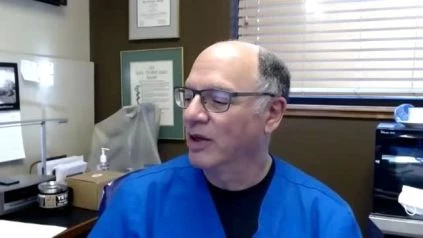Robert M. Rifkin, MD of the Rocky Mountain Cancer Center speaks about the ASH 2020 Abstract – 3247 DREAMM-7: A Phase III Study of the Efficacy and Safety of Belantamab Mafodotin (Belamaf) with Bortezomib, and Dexamethasone (B-Vd) in Patients with Relapsed/Refractory Multiple Myeloma (RRMM)
Introducing:
A B-cell maturation antigen (BCMA)-targeting antibody-drug conjugate is Belantamab mafodotin (belamaf; GSK2857916). In the pivotal Phase II DREAMM-2 trial, single-agent belamaf showed strong, long-lasting responses and a manageable safety profile in patients who were refractory and/or intolerant to ~3 treatment lines, including monoclonal anti-CD38 antibodies such as daratumumab (Lonial et al. Lancet Oncol 2020). Responses were preserved at 13-month follow-up with belamaf (2.5 mg/kg intravenous [IV] every 3 weeks [Q3W]); the average response rate (ORR) was 32% and the median response time (DoR) was 11.0 months (Lonial et al. ASCO 2020 Poster 436).
Triple combination regimens, such as daratumumab plus bortezomib and dexamethasone (D-Vd), are considered normal treatment regimens for RRMM patients and have shown superior monotherapy antimyeloma efficacy and dual combination regimens, such as bortezomib and dexamethasone.
Preclinical evidence suggests that belamaf and bortezomib (a proteasome inhibitor) have synergistic antimyeloma activity, and initial findings from the ongoing Phase I/II DREAMM-6 B-Vd trial indicate an appropriate safety profile for the combination (Nooka et al. ASCO 2020 Oral 8502). The efficacy and protection of B-Vd compared with D-Vd in patients with RRMM will be tested in the DREAMM-7 analysis (NCT04246047).
Methodology:
DREAMM-7 is a Phase III, an ongoing, randomized, open-label, national, multicenter, two-arm study in patients with detectable RRMM who received approximately 1 prior treatment with the reported progression of the disease during or after their most recent treatment. It will be available for patients aged 18 years and over with Eastern Cooperative Oncology Community Success Status 0-2, the satisfactory function of the organ system, and who have informed consent. Patients that are intolerant to, or previously exposed to, daratumumab or bortezomib with anti-BCMA therapy will be removed. Patients will be stratified in accordance with the updated International Staging Framework, prior exposure to bortezomib, and the number of previous treatment lines.
Approximately 478 patients will have Arm A (B-Vd) or Arm B randomized (1:1) (D-Vd).
In Arm A, on day 1 of each cycle, patients will receive belamaf 2.5 mg/kg (IV) Q3W; bortezomib 1.3 mg/m2 (subcutaneous) on days 1, 4, 8, and 11 of cycles 1-8 (21-day cycles); and dexamethasone 20 mg (IV or oral) on the day of and on the day after treatment with bortezomib. Patients in Arm B will receive daratumumab 16 mg/kg (IV) in 21-day cycles: Cycles 1-3 Q1W, Cycles 4-8 Q3W, and Q4W from Cycle 9 onwards; the schedules for dexamethasone and bortezomib will be the same as in Arm A. Before disease progression, death, intolerable toxicity, withdrawal of consent, or completion of testing, treatment will proceed in both arms.
Progression-free survival is the principal endpoint (PFS; time from randomization to the earliest date of documented disease progression or death [any cause]). As measured by next-generation sequencing, the primary-secondary endpoint is minimal residual disease negativity incidence. Full response rate, ORR, DoR, PFS2 (PFS after initiation of new anticancer therapy), overall survival, and endpoints related to pharmacokinetics, anti-drug antibodies, protection, and quality of life-related to health are additional secondary endpoints. The study is registered as of August 2020.

